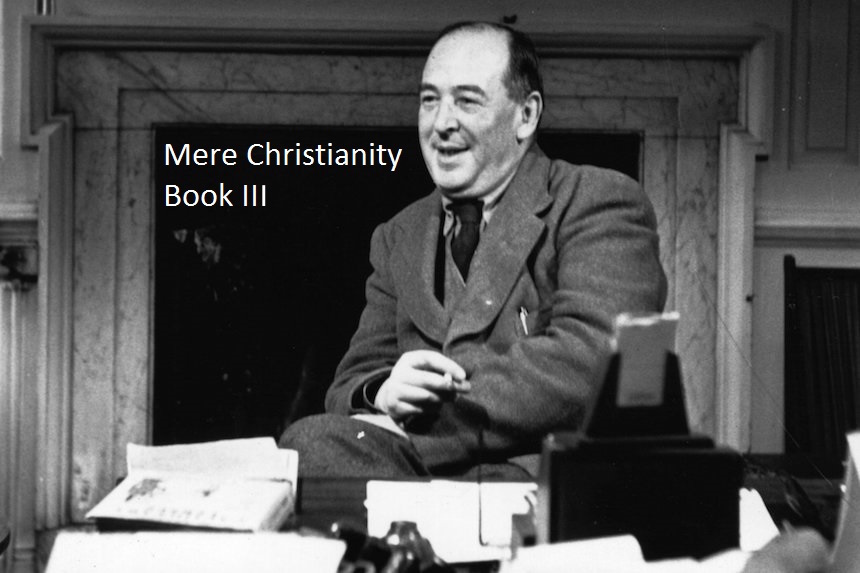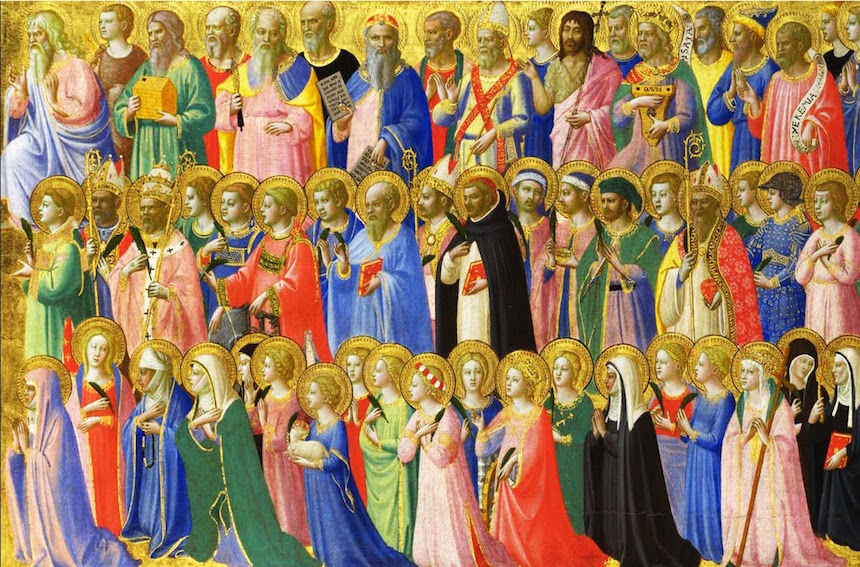Mere Christianity – Book III (Summary)


You can look at my more detailed notes, but this is an overview of the content of Book III of “Mere Christianity”…
Chapter 1 – “The Three Parts of Morality”
Morality isn’t about interference but our own good
“…moral rules are directions for running the human machine. Every moral rule is there to prevent a breakdown, or a strain, or a friction, in the running of that machine”
Morality isn’t about “ideals”
“It might lead you…to think you were rather a special person…you might just as well expect to be congratulated because, whenever you do a sum, you try to get it quite right… By talking about rules and obedience instead of “ideals” and ‘idealism’ we help to remind ourselves of these facts”
Fleet of Ships
“The voyage will be a success only… if the ships do not collide and get in one another’s way; and, secondly, if each ship is seaworthy and has her engines in good order… you cannot have either of these two things without the other. If the ships keep on having collisions they will not remain seaworthy very long. On the other hand, if their steering gears are out of order they will not be able to avoid collisions… [finally], its voyage would be a failure if it were meant to reach New York and actually arrived at Calcutta”
Musical Band
“…think of humanity as a band playing a tune. To get a good result…each player’s individual instrument must be in tune and also each must come in at the right moment so as to combine with all the others… the performance would not be a success if they had been engaged to provide dance music and actually played nothing but…Marches”
Exterior, Interior and Teleological Dimensions to Morality
“When people say in the newspapers that we are striving for Christian moral standards, they usually mean that we are striving for kindness and fair play between nations, and classes, and individuals; that is, they are thinking only of the first thing”
Why the second dimension is important
“…the results of bad morality in [the first] sphere are so obvious…war and poverty and graft and lies and shoddy work. And also, as long as you stick to the first thing, there is very little disagreement about morality… [However], unless we go on to the second thing – the tidying up inside each human being – we are only deceiving ourselves.
What is the good of telling the ships how to steer so as to avoid collisions if, in fact, they are such crazy old tubs that they cannot be steered at all? What is the good of drawing up, on paper, rules for social behaviour, if we know that, in fact, our greed, cowardice, ill temper, and self-conceit are going to prevent us from keeping them?”
…nothing but the courage and unselfishness of individuals is ever going to make any system work properly… It is easy enough to remove the particular kinds of…bullying that go on under the present system: but as long as men are twisters or bullies they will find some new way of carrying on the old game under the new system. You cannot make men good by law: and without good men you cannot have a good society. That is why we must go on to think of the second thing: of morality inside the individual”
Why the third dimension is important
“…religion involves a series of statements about facts, which must be either true or false. If they are true, one set of conclusions will follow about the right sailing of the human fleet: if they are false, quite a different set
…If somebody else made me, for his own purposes, then I shall have a lot of duties which I should not have if I simply belonged to myself…there are a good many things which would not be worth bothering about if I were going to live only seventy years, but which I had better bother about very seriously if I am going to live for ever”
The Consequences of Eternity
“Perhaps my bad temper or my jealousy are gradually getting worse – so gradually that the increase in seventy years will not be very noticeable. But it might be absolute hell in a million years: in fact, if Christianity is true, Hell is the precisely correct technical term for what it would be if Christianity is true, then the individual is not only more important but incomparably more important, for he is everlasting and the life of a state or a civilisation, compared with his, is only a moment”
Questions
1. How do many people view morality? How does Jack present it?
2. What is the problem with talking about morals as “ideals”?
3. What are the two metaphors Jack uses to explain the different components of morality?
5. What are these three parts of morality? Around which parts are there consensus?
6. What can we not just stop at inter-personal morality? Why does interior morality matter? What are the consequences for society?
7. Why does it matter if we live forever?
Chapter 2 – “The ‘Cardinal Virtues’”
“It comes from a Latin word meaning “the hinge of a door”…they are… ‘pivotal'”
Prudence
“Prudence means practical common sense, taking the trouble to think out what you are doing and what is likely to come of it… [Christ] wants us to be simple, single-minded, affectionate, and teachable, as good children are; but He also wants every bit of intelligence we have to be alert at its job, and in first-class fighting trim.”
Temperance
“Temperance referred not specially to drink, but to all pleasures; and it meant not abstaining, but going the right length and no further… [However], the moment he starts saying [marriage, or meat, or beer, or the cinema] are bad in themselves, or looking down his nose at other people who do use them, he has taken the wrong turning… One great piece of mischief has been done by the modern restriction of the word Temperance to the question of drink. It helps people to forget that you can be just as intemperate about lots of other things”
Justice
“It is the old name for everything we should now call “fairness”; it includes honesty, give and take, truthfulness, keeping promises, and all that side of life”
Fortitude
“…the kind [of courage] that faces danger as well as the kind that “sticks it” under pain… you cannot practise any of the other virtues very long without bringing this one into play”
Act and Character
“Someone who is not a good tennis player may now and then make a good shot. What you mean by a good player is the man whose eye and muscles and nerves have been so trained by making innumerable good shots that they can now be relied on… Right actions done for the wrong reason do not help to build…”virtue,” and it is this quality or character that really matters… If people have not got at least the beginnings of those qualities inside them, no possible external conditions could make a “Heaven” for them…”
Questions
1. Why might some Christians not think that prudence is a virtue?
2. Why is it dangerous to restrict “temperance” to “drink” and “teetotalism”?
3. What is the difference between acts and character?

 Today I’m very pleased to announce the launch of my latest podcast, “The Eagle and Child”.
Today I’m very pleased to announce the launch of my latest podcast, “The Eagle and Child”.


